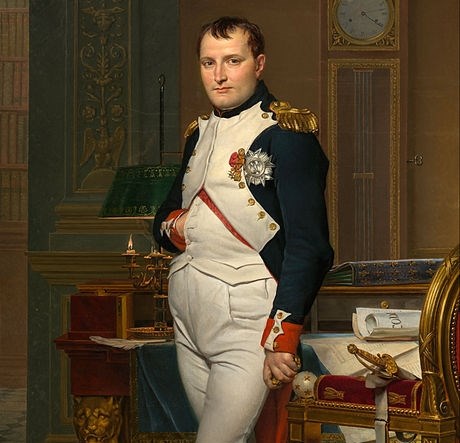 English description
English description
Napoleon in Ilirske province
Napoleon Bonaparte je bil rojen na Korziki 15. avgusta 1769. Od mladih let se je šolal za vojaško službo. Leta 1799 je postal vodja Francije, nato se je leta 1804 oklical za prvega cesarja Francije z imenom Napoleon I le Grand. Njegova vladavina je trajala 10 let, v tem času je zavzel in vladal večini Zahodne in Srednje Evrope.

Na območju Slovenije je Napoleon ustanovil Ilirske province, s središčem v Ljubljani. Province niso bile sestavni del francoskega cesarstva, vendar so bile z njim močno povezane. Služile so za carinsko blokado na obalah Jadrana, zahodni Koroški, Kranjskem do Save, po Savi do Zagreba, proti Bosni in Dalmaciji vse do Boke Kotarske na jugu.
Francoska vladavina Ilirskih provinc je močno pripomogla k dvigu narodne samozavesti in zavedanja o svoboščinah, ter pomembnosti lastnega jezika, kulture in obstoja. Napoleonov pristaš in pomemben člen pri ohranjanju slovenske samozavesti je bil slovenski pesnik Valentin Vodnik.
Po Napoleonovih poteh
Potovanje po Napoleonovih poteh bomo pričeli v Ljubljani, pri Plečnikovem spomeniku Napoleonu in Iliriji (točka A) na Trgu francoske revolucije, ki je bil postavljen ob 120. letnici ustanovitve Ilirskih provinc. Od tam se bomo odpravili v smeri Logatca, še preden pa bomo prispeli tja, se bomo ustavili pri Škandrovi hiši (točka B) na Logu pri Brezovici, v kateri je po ustnem izročilu prespal Napoleon. V Logatcu si bomo ogledali Napoleonov drevored (točka C), ki poteka ob stari cesti od Vrhnike proti Logatcu in je bil posvečen poroki med Napoleonom in Marie Luize. Iz Logatca se bomo usmerili proti spodnji Zaplani, kjer lahko ob cesti opazimo Napoleonov vodnjak (točka D). Od tam bomo pot nadaljevali do cerkve Marijinega vnebovzetja v Smrečju (točka E), katere praznik se praznuje 15. avgusta, ta datum pa tudi sovpada z rojstnim dnevom Napoleona. Nazadnje se bomo zapeljali še v Polhov Gradec, kjer si bomo na notranjih stenah grajskega izvira Polhograjske graščine ogledali lastnoročne podpise Napoleonovih vojakov (točka F). S prihodom nazaj v Ljubljano bomo zaključili s potovanjem po Napoleonovih poteh.

Cerkev Marijinega vnebozetja Smrečje
Napoleon se je rodil 15. avgusta, na dan, ko praznujemo praznik Marijinega vnebovzetja, kateri je posvečena tudi cerkev v Smrečju. Ker je imel v napoleonovih časih pravico do kronanja le papež, mu je Napoleon vzel krono iz rok in mu s tem dal vedeti, da mu bo morala biti cerkev podrejena.
S tem dejanjem je Napoleon ločil cerkev od države, sam pa se je lahko proglasil za cesarja. Ker naj bi bil po njegovem v Evropi le en cesar, je takratnega cesarja Rimsko-Nemškega cesarstva prisilil v sprejetje naziva kralj, istočasno pa je Napoleon postal edini evropski cesar.
 English description
English description
Napoleon and the Illyrian Provinces
Napoleon Bonaparte was born in Corsica on August 15, 1769. From a young age he studied for military service. In 1799 he became the leader of France and then in 1804 he proclaimed himself as the first French emperor with the name Napoleon I le Grand. His reign lasted for 10 years. During this time he conquered and ruled over most of western and central Europe.

In what is now Slovenia he established the Illyrian Provinces with its centre in Ljubljana. The provinces were never a part of the French Empire, but were still closely connected to it. They served as a customs blockade ranging from the Adriatic Sea, through western Karst to the Sava River in Carniola, then following the Sava River to Zagreb, Bosnia and Dalmatia spanning all the way to the Bay of Kotor in the south.
The French rule in the provinces greatly helped increase national consciousness and the awareness of personal freedoms while also impacting the importance of language and culture. Napoleon’s adherent and a very important link in the conservation of Slovene national consciousness was Slovene poet Valentin Vodnik.
Following Napoleonic trails
We will begin the trip along Napoleonic trails in Ljubljana in front of Plečnik’s monument to Napoleon and Illyria (location A) on Trg Francoske Revolucije (French Revolution Square) that was constructed on the 120th anniversary of the establishment of the Illyrian Provinces. From there we will set foot towards Logatec, but before we arrive there, we will make a stop at Škander house (location B) in Log pri Brezovici where, according to oral tradition, Napoleon once stayed the night. When we arrive to Logatec we will first look at Napoleonov drevored (Napoleon Avenue) (location C) which runs along the old road from Vrhnika to Logatec and was dedicated to the marriage between Napoleon and Marie Louise. After Logatec we will make our way towards lower Zaplana where we can observe Napoleon’s well (location D) by the roadside. From there we will continue towards the Church of the Assumption in Smrečje (Cerkev Marijinega vnebovzetja) (location E), the holiday of which is celebrated on August 15 and also coincides with Napoleon’s birthday. Lastly we will drive to Polhov Gradec where we will take a look at handwritten signatures of Napoleon’s soldiers (location F) on the inside walls of the mansion in Polhov Gradec. We will end our trip along Napoleonic trails by returning back to Ljubljana.

Church of the Assumption in Smrečje
Napoleon was born on August 15, the same day we celebrate the Assumption of the Virgin Mary to which the church in Smrečje is dedicated to. In Napoleon’s times the only one with the power of coronation was the Pope, but Napoleon had other ideas. He snatched the crown from the Pope’s hands and put it on his head himself to show that the Church should bow to him and not the other way around.
With this action Napoleon separated Church and State while he could proclaim himself the Emperor. Because he thought Europe should only have one Emperor he made the Emperor of the Roman-German Empire renounce his title and call himself King. This is how Napoleon became the only European Emperor.